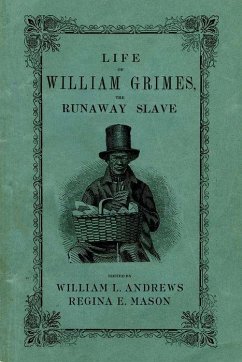Life of William Grimes, the Runaway Slave is the first fugitive slave narrative in American history. When it appeared in New York in 1825, it was the longest African American autobiography published up to that time. Because Grimes wrote and published his narrative on his own, without deference to white editors, publishers, or sponsors, his Life has an immediacy, candor, and no-holds-barred realism unparalleled in antebellum slave narratives. The famous fugitives of the 1840s and 1850s, even Douglass, Brown, and Harriet Jacobs, all wrote in accordance with an antislavery script that circumscribed their freedom to speak out about what they had experienced as slaves in the South and as quasi-free men and women in the North. William Grimes, however, wrote before this formulaic script had been composed. Life appeared years before the advent of any organized national American antislavery movement, before David Walker's Appeal (1829), before the first African American newspaper, before William Lloyd Garrison had publicly acknowledged himself an abolitionist, before Frederick Douglass could read the word "abolitionist." Beholden to no one and unschooled in antislavery propaganda, Grimes's Life represents a truly unfiltered and personally authentic account of both southern slavery and the severely compromised "freedom" of the northern states in antebellum America. This edition of Life of William Grimes represents an historic partnership between a prominent scholar of the African American slave narrative and a genealogist who is also direct descendant of Grimes himself. Regina Mason, the great-great-great-granddaughter of William Grimes, combines her extensive historical research into her family and the text of her ancestor with William L. Andrews's scholarship on the origins and development of African American autobiography. The result is an authoritative, copiously annotated text that features pages from an original Grimes family Bible, transcriptions of the 1824 correspondence that set the terms for the author's self-purchase in Connecticut (nine years after his escape from Savannah, Georgia), and many other striking images that invoke the life and times of William Grimes.








